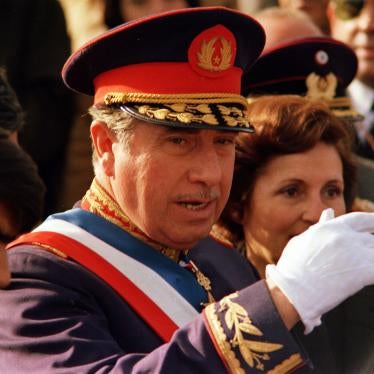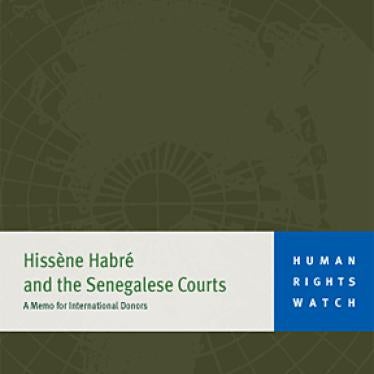As Senegal's President Abdoulaye Wade visits New York, Human Rights Watch urges him to seek the re-instatement of torture charges against the exiled Chadian dictator Hissene Habré.
Habré who ruled Chad from 1982 to 1990 before fleeing to Senegal, was indicted by a Senegalese court in February, marking the first time an African country had brought a rights case against another nation's head of state.
After Wade was elected president in March, however, he named Habré's attorney as a special adviser and a presidential panel removed the judge investigating the case. The government then supported Habré's move to dismiss the charges, and in July a court whose presiding judge had just received a new presidential appointment threw out the case on the ground that Senegal had no jurisdiction to prosecute torture in Chad. Chad's torture victims have appealed to Senegal's highest court.
The dismissal of the charges and the apparent executive interference drew protests from the United Nations, Senegal's association of judges and rights activists in both Chad and Senegal. United Nations envoys on torture and the independence of the judiciary expressed their concern to the government of Senegal over the circumstances surrounding the dismissal of the charges and called on the government to ensure an independent and impartial investigation of the allegations. The UN monitors also reminded the government of its obligations under the 1984 United Nations Convention Against Torture, which Senegal ratified in 1986, to prosecute alleged torturers who enter its territory.
In a July 21 editorial, "Justice Denied in Senegal," the New York Times called the ruling "particularly disappointing" and protested "what looks suspiciously like interference from the country's new president."
"Hissene Habré is an African Pinochet," said Reed Brody, Advocacy Director of Human Rights Watch, one of the organizations which helped initiate the criminal action against Habré "President Wade should support the victims' appeal and help put an end to the routine practice of the worst tyrants moving into comfortable exile next door."
"My country has always been a leader in human rights," said Alioune Tine of the Dakar-based African Assembly for the Defense of Human Rights (RADDHO). "The shenanigans surrounding this case are hurting our reputation and betraying those who placed their faith in Senegalese justice."
Sixty Chadian victims are acting as private plaintiffs in the case as well as the Chadian Association of Victims of Political Repression and Crime (AVCRP), which represents 792 victims of Habré's brutality.
A 1992 Chad truth commission report accused Habré and his government of 40,000 political murders and systematic acts of torture and brutality.
Habré 57, took power in Chad in 1982, overthrowing the government of Goukouni Wedeye. Habré's one-party regime, supported by the United States and France, was marked by widespread abuse and campaigns against the ethnic Sara (1986) Hadjerai (1987) and the Zaghawa (1989). Habré was deposed in December 1990 by current president Idriss Deby.
President Wade, whose election ended decades of one-party rule in Senegal, is in New York to address the Millennium Summit of the United Nations.







